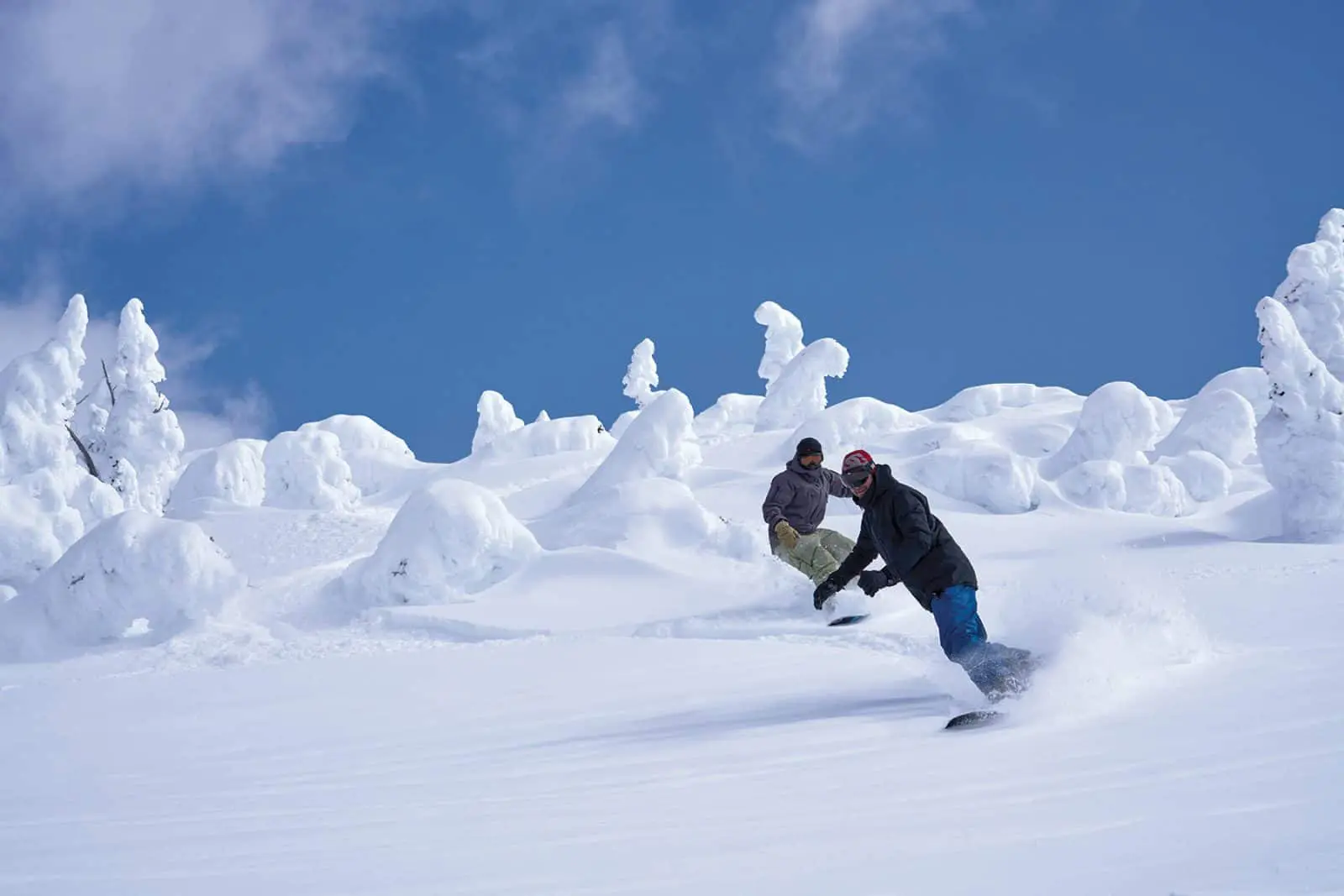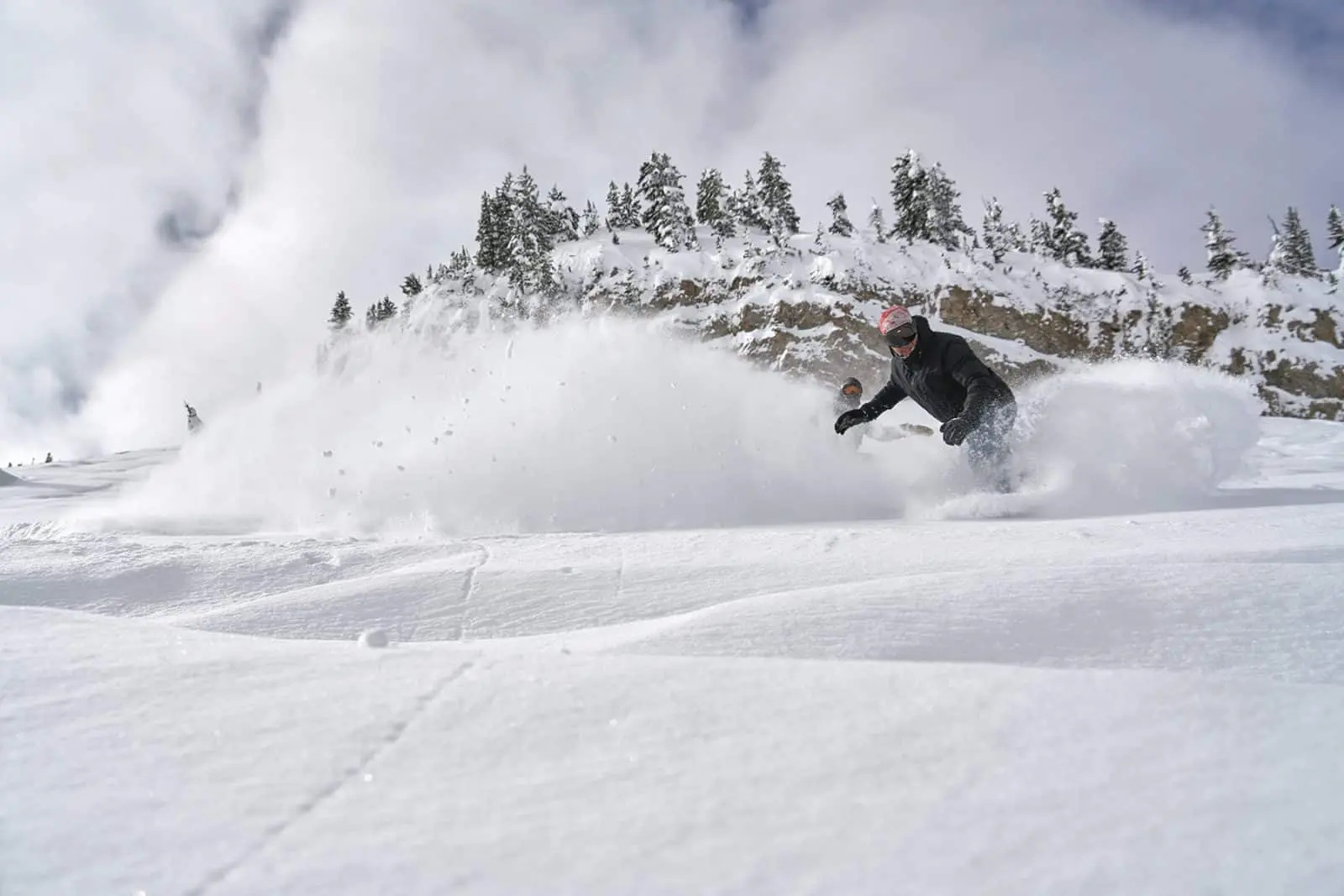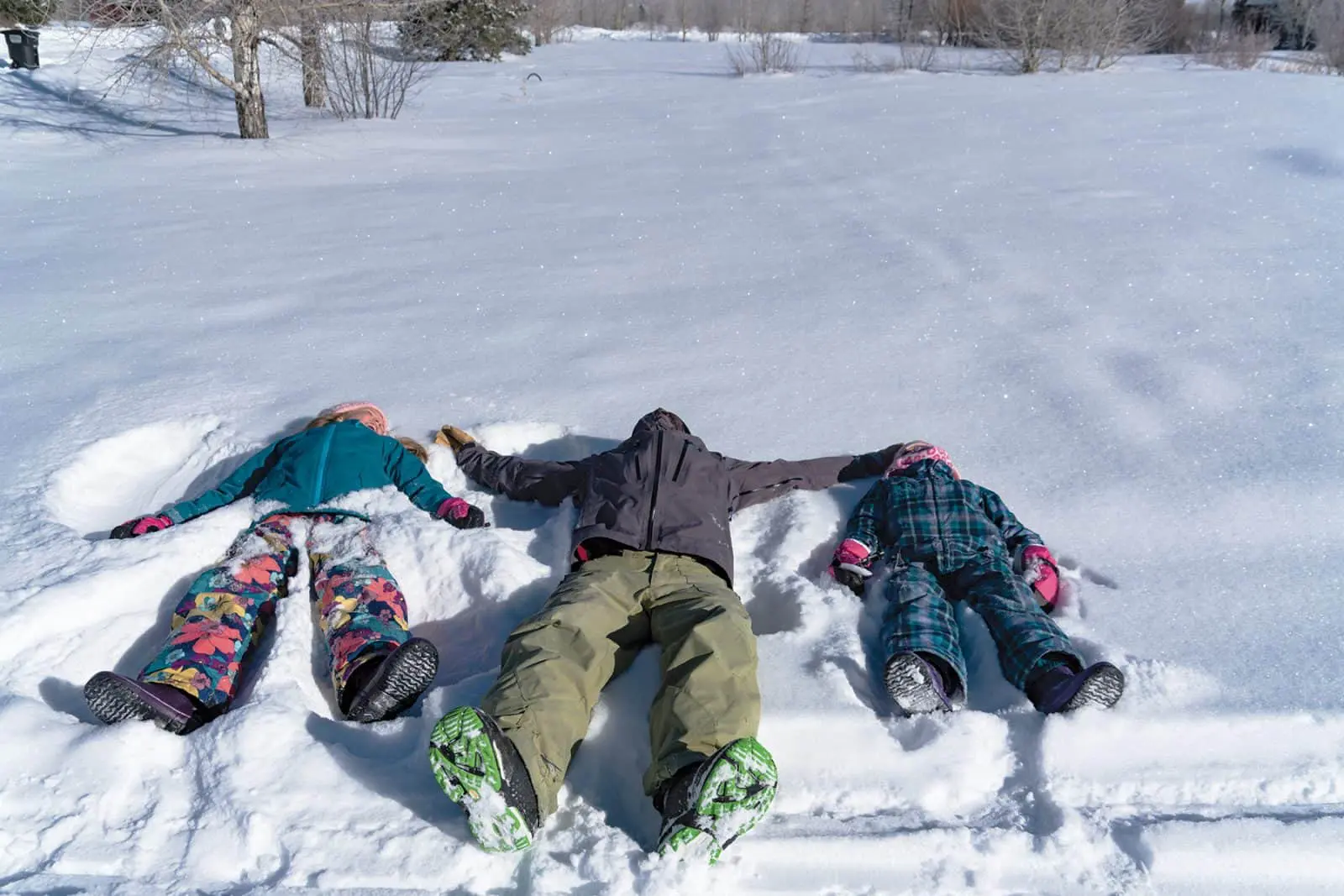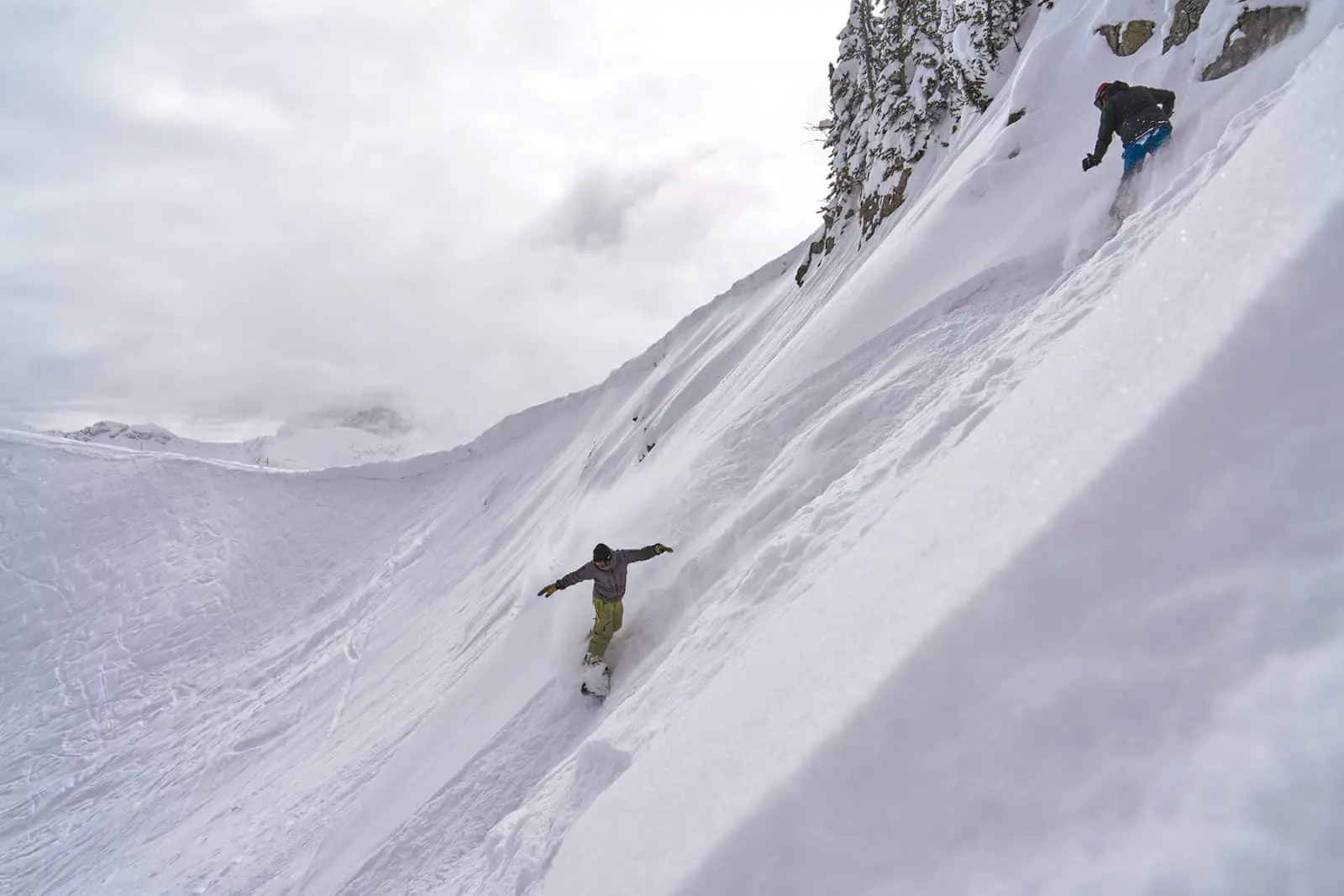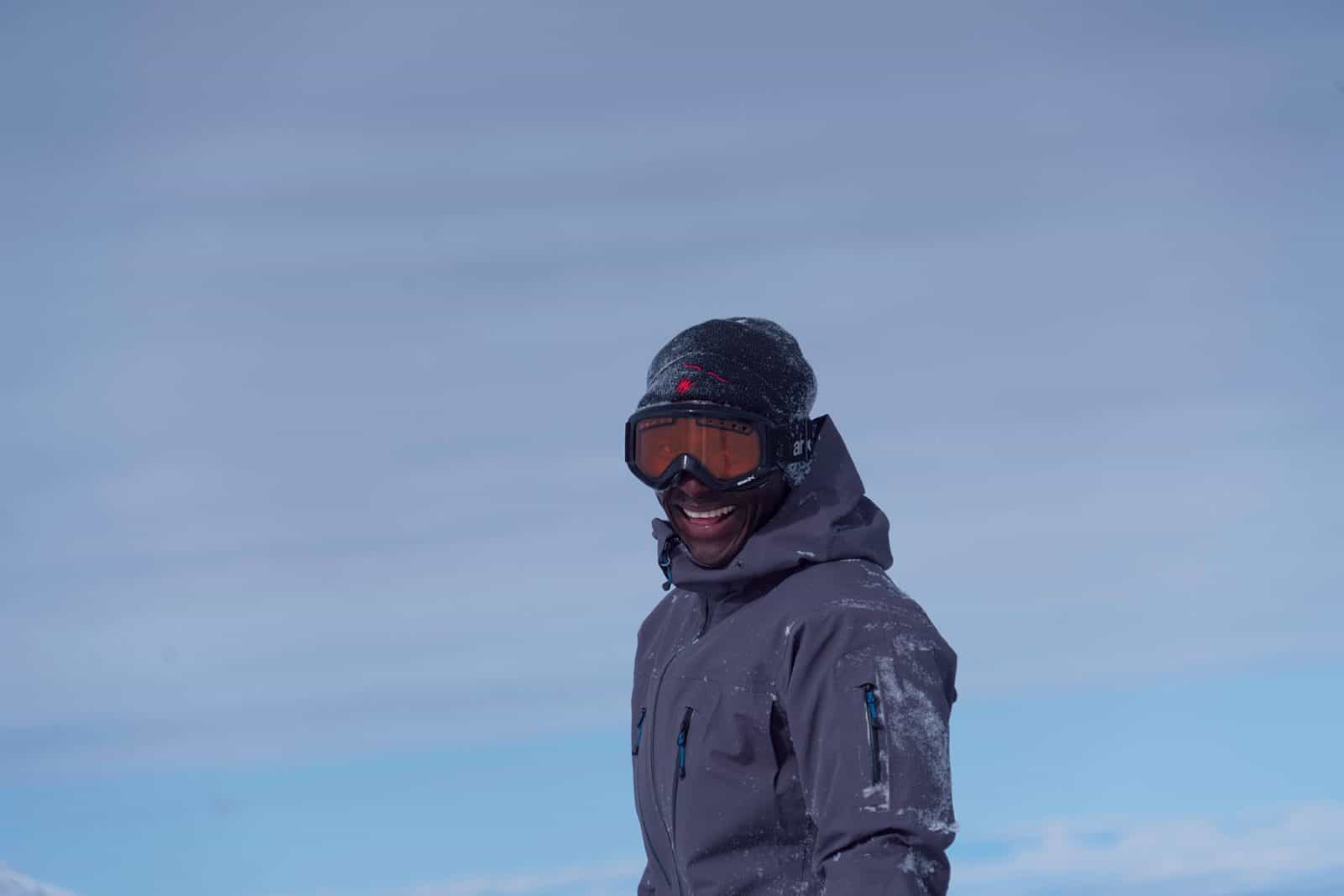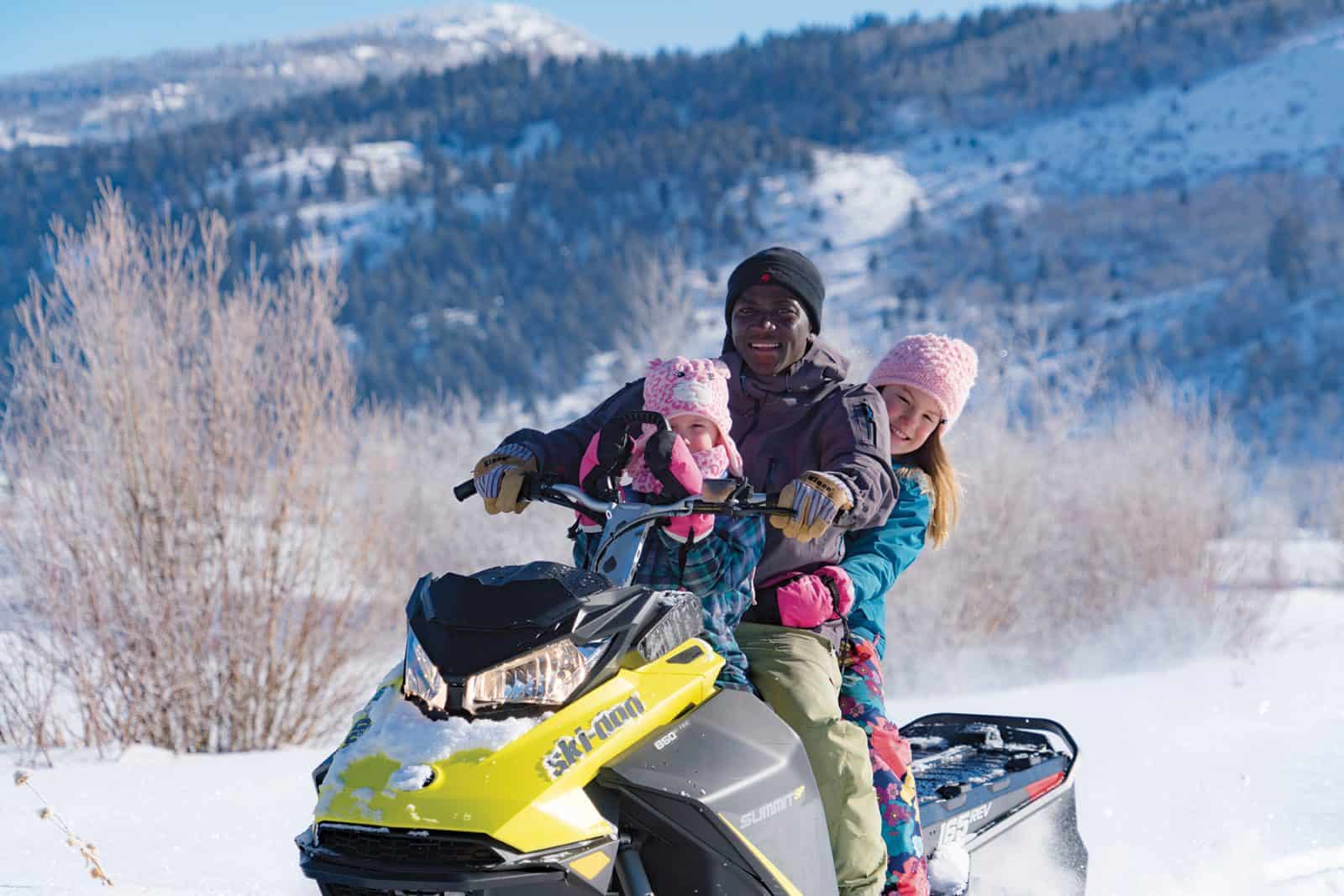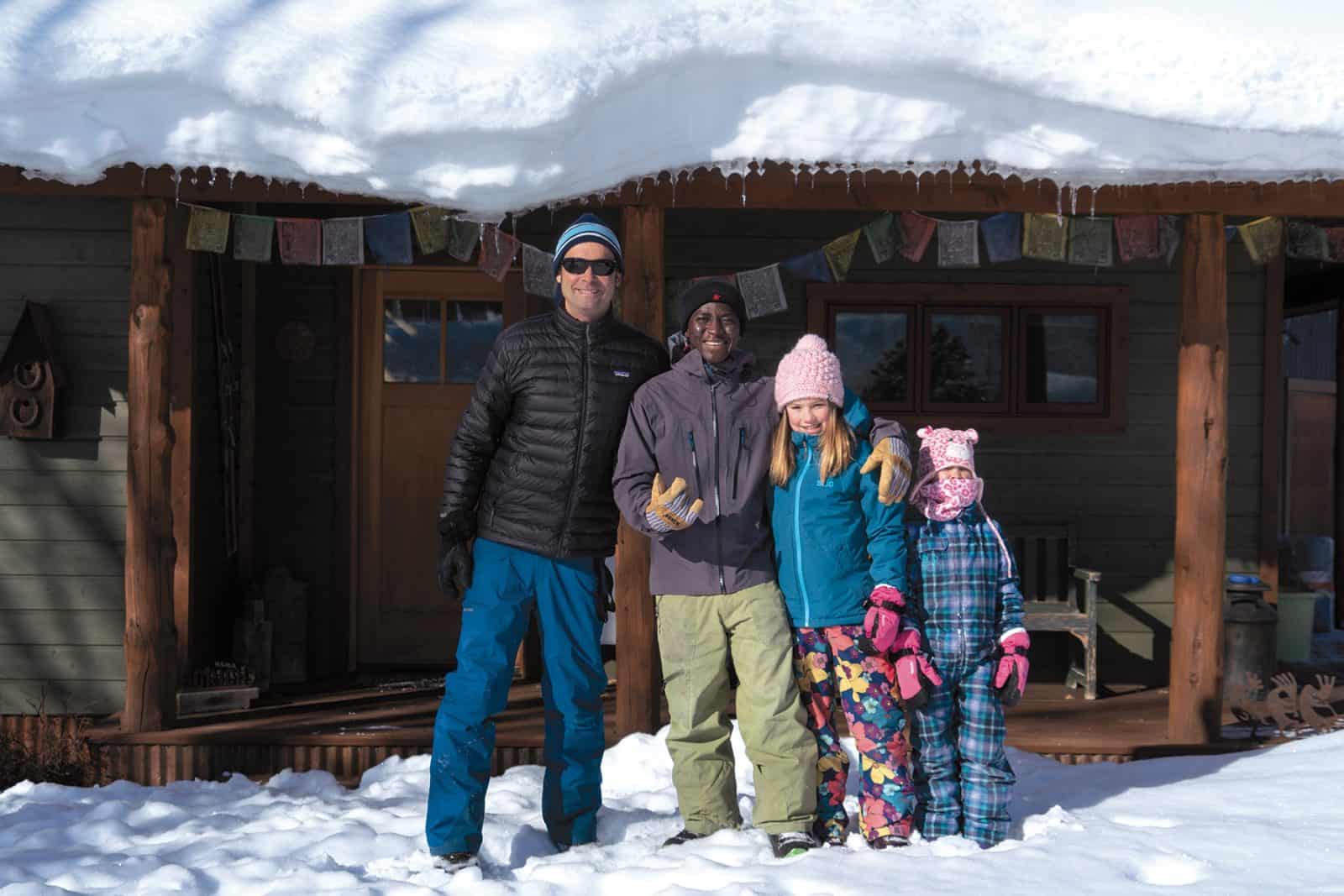By Christina Shepherd McGuire // Photography by Mike McKelvey
—
Alpha Barrie is my friend. He’s my husband’s friend and a good friend to my children. In fact, looking at him—a man with an upbringing and culture so different from our own—through the eyes of a child, the distinctions barely show.
You see, we all love to snowboard. We get filled up by the mountains in the same way, and the endorphin-induced fatigue at the end of a day spent on the hill manifests equally in all of us. Alpha’s infectious personality and innocent stoke is the cup of hot cocoa to our cold winter day. And he makes us all realize, as a family, just how good we have it—in both our country and our mountain community.
I was introduced to Alpha three years ago by our friend, Victor resident Adam Towle. Adam, an unlikely surfer from Topeka, Kansas, planned a trip to Sierra Leone, Africa, in 2016, not long after the country was stricken with a massive Ebola outbreak, putting the world on high alert. He was in search of waves and was attracted to the West African coast because he wanted to help out. Disease, war, and treacherous conditions never thwarted any of Adam’s cockamamie excursions before. Still, though my husband and I chuckled over his indifference to the conditions in Africa, we stifled our concern for his well-being.
Once overseas, Adam was welcomed with open arms by Alpha’s hometown of Bureh Beach—a small community of 600 people on Africa’s west coast, about a two-hour drive south of the capital city Freetown. He came gifting supplies for the local surfers and ready to help purchase paint and get to work on the Bureh Beach Club, an ex-pat enclave where Alpha worked.
Adam and Alpha’s friendship grew during weeks spent together exploring neighboring surf spots. Adam introduced Alpha to the concept of surfing on snow, a medium foreign to the West African, showing him videos on his phone and kindling Alpha’s imagination.
“He told me about snowboarding,” said Alpha. “And since I grew up doing board sports, I thought, ‘I’d love to try something new.’ It made me excited to see something I’ve never seen in my life. … Adam and I spoke the same language.”
Before Adam departed for home, Alpha asked his new friend if he would help him travel to the States to learn how to snowboard.
“I gave him my word that I would try my best to get him here,” Adam said, “But I didn’t give it much of a chance of happening. It’s hard for a young guy with no assets to get a tourist visa. So I told him if he found out what it took [to obtain a visa], I’d help him.”
One hundred and sixty American dollars later, and with a visa application in hand, Adam knew Alpha was serious.
“I had to get Alpha completely outfitted for winter, head to toe. Friends donated boots, bindings, and clothing. And Targhee donated a pass. … Random people at the [Knotty Pine] were giving me $100 bills so that I could get him what he needed.” – Adam, Alpha’s sponsor
“To me, $160 is a slow night of work at the Knotty Pine,” said Adam, referring to the Victor venue where he works as bar manager. “If there was a chance we could make it happen, it was worth the expense.”
An Improbable Promise
Alpha, 26, grew up with his mother and grandmother, both fishmongers. He has two siblings—Fatmata, 21, and John, 16—and a 6-year-old daughter, Henrietta. They all live with Alpha’s mother, and John and Henrietta go to school in the nearby town of Tumbu, riding taxis about six miles each way, with school days dependent upon the passibility of unimproved roads. The thought of international travel to Alpha or any of his relatives seemed like a pipe dream, but the family fully supported their son, brother, and father.
So Alpha got to work on the visa process, filling out stacks of paperwork and studying interview questions with the help of his friend, Matt Gill, an American ex-pat surfer working in Sierra Leone. Matt spent most of his downtime coaching Alpha on what to say and how to present himself.
“I gave him about a 20 percent chance,” Adam said of Alpha’s visa prospects. “Still, on my end, I needed him to have an angle. I wanted to make Alpha the first Sierra Leonean snowboarder.”
Adam wrote to immigration explaining how experiencing snow sports would benefit Alpha and his country. Jackson Hole Snowboard Team coach Lance Pittman wrote an invitation letter to Alpha, emphasizing the Jackson Hole Ski and Snowboard Club’s mission of making snow sports inclusive to all. And then, one week before Alpha’s interview, Adam opened a savings account and deposited enough money to show that he could support this young African man.
Adam sent Alpha $60 to buy new clothes for the interview, and Matt drove Alpha to the American Embassy in Freetown, where he nervously sat in the waiting room watching the four people in front of him get denied. But during Alpha’s own nerve-racking interview, the immigration officer asked him to hand in his passport. That instant, Alpha knew he was in.
A Home Without Barriers
And so began Alpha’s three-winter stay in the Tetons, living with Adam and his wife, Tressa, in Victor and snowboarding nearly every day.
During his first season, the community rallied to support their newfound friend.
“I had to get Alpha completely outfitted for winter, head to toe,” recalled Adam. “Friends donated boots, bindings, and clothing. And Targhee donated a pass. … Random people at the bar were giving me $100 bills so that I could get him what he needed.”
Adam had no idea that the community would care as much as he did about an African man’s journey from a poor beach town to an affluent resort destination. And Alpha acknowledged his supporters by approaching snowboarding like it was his job—proficiency being his payback. Armed with everything he needed to play in the mountains, he quickly took to the sport and soon was surfing the snow as if it were the familiar waves of his own backyard.
For Adam and Tressa, the makeshift family they created with Alpha brought them a joy that can only be experienced by those who have bettered another’s existence. Alpha integrated himself right into the family scene: washing dishes, vacuuming the house, tending the farm animals. Alpha’s primarily pescatarian diet was transformed when he was introduced to bacon and when he sank his teeth into a juicy burger at The Pine. The family snowmobiled deep into the backcountry together and ventured on horse-packing trips when the winter snow receded.
After the first year, Alpha established his pattern: He would spend six months in the Tetons, then go back home to Africa with the hopes that Salt Lake City immigration would let him back in again six months later.
Much More Than a Project
Homeschoolers Laila and Avery Borich (11 and 7, respectively), of Victor, learned about Alpha through their parents and were inspired to meet and welcome him to the valley. So they scheduled a ski and snowboarding date together as part of their usual homeschool schedule. The morning pickup was early and the snow report: good.
“It felt weird when we picked him up because we didn’t really know him,” recalled Laila. “Then, on our way to Targhee, things got a little better because he showed us how to do cute hairstyles on our Barbies.” (Alpha’s daughter Henrietta plays with Barbies.)
Jen Fisher, the girls’ mother, recalled how the “stoke was high” on that powder day. She remembered the group taking off from the chairlift and skiing through Targhee’s football fields and into the South Chutes, a place where Avery, 5 at the time, had never skied.
“I was scared because we followed [Alpha] somewhere I hadn’t been before,” said Avery.
But her fears melted when she heard cheers coming from the bottom of the run. Alpha and Kurt, the girls’ father, coached Avery through the steep rock bands to the bottom. And with the courage of accomplishment, yet another bond was formed.
The girls were motivated to discover more about their new friend and the place he called home. They researched Sierra Leone and learned about the country’s civil war and unrest. They journaled questions for Alpha—about his life and his family—and saved them for their next visit with him.
“I found out that he had a little girl and they didn’t have a house,” said Laila as she recounted her inspiration to start a GoFundMe page for Alpha.
She found out that it would take $15,000 to $20,000 to build a concrete house for Alpha’s family. With this goal set, they got to work on their page, communicating with Alpha back at home via Facebook, and adding pictures and profiles to their funding site. Once the page was up and running, the girls organized a pop-up lemonade stand and sold old toys and books, raising money to donate to the cause.
Throughout the process, there was much talk about the differences between Africa’s economy and that of the U.S. The girls discovered how, in many other cultures, families grow their own food and can’t “just go to the store and buy something,” said Laila.
“It’s harder to get money doing the same stuff we do here,“ she added.
This summer, Alpha completed the final year of his three-year tourist visa. But that doesn’t mean he’s gone for good. With the help of Adam and his family, immigration lawyers, and a U.S. senator to back him, Alpha was recently awarded another three-year visa. He will return this January to continue snowboarding and pursuing a GED, a process he is halfway through. The visa extension will take Alpha one step closer to his dreams of becoming an accountant, a trade he believes can better his African family’s fishmonger business.
With the backing of friends and a never-wavering attitude, Alpha’s U.S. experience holds remarkable meaning for this young man. But it’s the friendships formed in our unique and remote community that will forever live in his heart.
“[Coming to Teton Valley], honestly, changed my life in a better way,” said Alpha. “People are so nice and always want to help. It’s not like that back home, where only your family can help you. Here, people call me ‘brother.’ And it shows me how amazing the people are in this community.”
Laila and Avery hope to bring more attention to their “Alpha Project” this winter by holding marketing roundtables, spreading the word on social media, and sending out email blasts.
You can learn about their campaign at gofundme.com/f/the-alpha-project; any contribution not only helps provide a shelter for Alpha, but also further connects cultures in a seemingly divided world.
